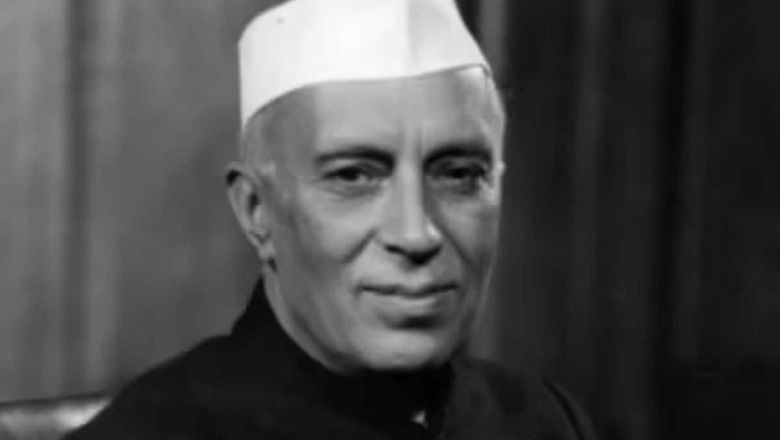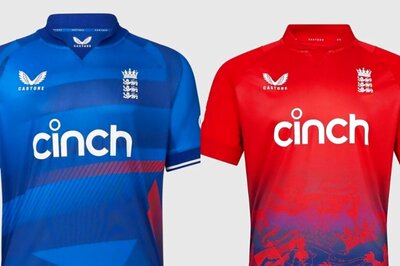
views
As Prime Minister Narendra Modi completes his visit to France, and India gives its nod to deals for purchasing 26 Rafale jets and three Scorpene submarines – all worth over Rs 90,000 crore – it may become pertinent to observe that such a high-value order is going through corruption-free, as in the case of all previous deals during this regime. There is no middleman of foreign origin, close family friends or agents making fund transfers to offshore bank accounts, as was the case innumerable times during decades of Congress rule in the past.
It seems that India is finally reaping the benefits of policy decisions where merit trumps kickbacks. Let us here consider the first case in the history of independent India, which set the precedent for the Congress and the Nehru-Gandhi family to exploit high-value deals. When the India-Pakistan war began in 1948, the Indian Army urgently required jeeps. Vengalil Krishna Menon, the then Indian High Commissioner to the UK and also a very close friend of then PM Jawaharlal Nehru, placed an order for about 2,000 refurbished jeeps from a company called M/s Anti-Mistantes.
Now, a little back history here – Menon had an understanding with the last British viceroy Louis Mountbatten that he’d be made the Indian high commissioner to the UK by lobbying for British interests and agreeing to “convince” his good friend Nehru on sensitive issues in Britain’s favour. Moving on, Menon who was a fully trusted ally of Nehru, not only placed this order but also framed shady terms of payment and delivery for the jeeps.
He agreed to pay 65 percent of the money for the jeeps, which were priced at about 300 pounds per vehicle on inspection, 20 percent on delivery and the remaining 15 percent a month after delivery. He also clarified that only 10 percent of the jeeps for delivery will be inspected. This meant that only after inspecting 10 percent of the refurbished jeeps, a full 85 percent of the total dues of about 6,00,000 pounds was made. In today’s value – that amount would be equivalent to 1,55,00,000 pounds, ie, Rs 160,00,000 – one hundred and sixty crore rupees.
The company, M/S Anti-Mistantes, was clearly shady – it only had paid up capital of about 600 pounds. Which is why, despite paying the above money, the company sent only about 155 jeeps, none of which were in functioning, usable condition. The armed forces rejected the jeeps. Not only did Anti-Mistantes refuse to recall the jeeps, but also went incommunicado.
Now, the need for jeeps was still standing, and Menon signed another contract with another company called SCK Agencies for 1,007 jeeps at a higher price of 458 pounds. The delivery terms were that 68 jeeps would be delivered monthly. He also explained that since these companies were only delivery agents, he got SCK Agencies to agree to compensate the Indian government for the earlier money paid for the jeeps. However, only 49 jeeps were supplied over two years by SCK Agencies and no money was compensated to the Indian government.
Nehru not only forced the Indian government to accept the substandard jeeps sent by Anti-Mistantes but also refused to demand a resignation from Menon. There was a massive uproar over this issue and Nehru was forced to form a committee to investigate the case. The Ayyangar Sub-Committee found many misappropriations and, on the basis of its submissions made on April 9, 1951, the Public Account Committee (PAC) started a formal investigation in the matter under the leadership of two former high court judges.
On December 18, 1954 – about three and a half years after the Ayyangar Sub-Committee submissions – the Nehru government asked the PAC to reconsider its decision on initiating a formal investigation and shut down the constituted committee, mid-investigation.
Menon was clearly out of line – high commissioners had no official capacity to make such agreements. He had gone out of his way to persuade relevant officers in the Indian government to sign the agreements he had arranged with two bogus companies. Despite this, Nehru inducted him into the union cabinet on February 3, 1956, and later made him the defence minister in 1959 following which he played a decisive role in India’s loss in the 1962 Indo-China War.
In a rather shady revelation, it came to light in the Mitrokhin Archives that Menon was being groomed by the Soviet intelligence agency, KGB, to promote Soviet propaganda in India. In fact, so much was the involvement of the Soviet deep state in India’s affairs, that Menon who had Nehru’s unparalleled attention, orchestrated the shift of India’s arms imports from the west to the Soviet Union during his tenure.
Nehru, on Menon’s insistence, dubiously so in the summer of 1962 also changed his decision to purchase British Lightnings to MIG-21s, due to KGB’s active-measures operations. This decision cost us the Indo-China War because the Soviets refused to send us the MIG-21s during the war, when India needed them the most.
After it became clear that not only did Nehru refuse to reprimand his friend for obvious questionable dealings and financial fraud, which cost the country, but in fact protected and promoted him, it set a culture of shady dealings within the Congress with approval right from the top.
This is Part II of a multi-part series. A look at the other parts:
Part I: Opinion | Indian Prime Ministers and Cases of Corruption: Rajiv Gandhi’s Indefensible Defence Deals
Part III: Opinion | Indian Prime Ministers and Cases of Corruption: Indira’s Biggest Racket — ‘Garibi Hatao’
Part IV: Opinion | Indian Prime Ministers and Cases of Corruption: Indira’s Dhritrashtra Syndrome & Emergency Excesses
Priyam Gandhi-Mody is an author of three bestselling books, including ‘A Nation to Protect’. Her fourth book is expected to be released in October 2023. Views expressed in the above piece are personal and solely that of the author. They do not necessarily reflect News18’s views.




















Comments
0 comment